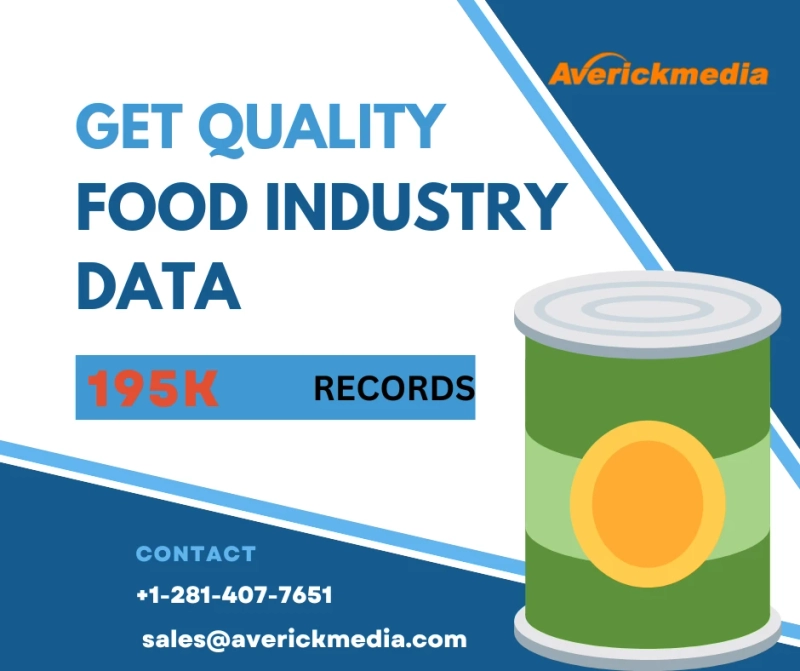Introduction
In today's fast-paced world, the food and beverage industry is constantly evolving. From new product launches to emerging trends, staying up-to-date with the latest information is crucial for businesses in this sector. This is where the food and beverage industry database comes into play. In this comprehensive guide, we will explore the ins and outs of this invaluable resource, its benefits, and how it can help businesses thrive in this competitive landscape.
What is a Food and Beverage Industry Database?
A food and beverage industry email list is a centralized repository of information related to various aspects of the food and beverage industry. It encompasses a wide range of data, including market trends, consumer preferences, product information, industry regulations, and more. This database serves as a valuable tool for businesses, researchers, and professionals looking to gain insights and make informed decisions.
The Importance of a Food and Beverage Industry Database
The food and beverage industry is highly dynamic, with rapidly changing trends and consumer demands. Access to accurate and reliable information is crucial for businesses to stay ahead of the curve. Here are some key reasons why a food and beverage industry database is essential:
Market Intelligence: A comprehensive database provides valuable insights into market trends, competitor analysis, and consumer behavior. This information helps businesses identify new opportunities, develop effective marketing strategies, and make data-driven decisions.Product Development: Understanding consumer preferences and emerging trends is vital for successful product development. By leveraging a food and beverage industry database, businesses can gather insights on market gaps, new ingredients, and innovative packaging solutions.Compliance and Regulations: The food and beverage industry is subject to strict regulations and compliance standards. A database that compiles relevant information on food safety, labeling requirements, and regulatory changes helps businesses ensure compliance and avoid penalties.Supplier and Partner Selection: Finding reliable suppliers and partners is crucial for the success of any food and beverage business. A comprehensive database enables businesses to evaluate potential suppliers based on factors such as certifications, quality standards, and track record.Industry Networking: The food and beverage industry is highly collaborative, and networking plays a vital role in business growth. A database can provide contact information and facilitate connections with industry experts, associations, and potential collaborators.How to Access a Food and Beverage Industry Database
Accessing a food and beverage industry database is easier than ever before, thanks to technological advancements. There are several ways businesses can obtain this valuable resource:
Commercial Databases: Many companies specialize in curating and maintaining industry-specific databases. These commercial databases offer a wealth of information and provide subscription-based access to businesses.Trade Associations: Industry trade associations often maintain databases that are accessible to their members. Joining relevant associations can provide businesses with access to exclusive resources and networking opportunities.Government Agencies: Government agencies, such as the Food and Drug Administration (FDA) and the United States Department of Agriculture (USDA), provide online databases with regulatory information, safety alerts, and industry reports.Market Research Firms: Market research firms conduct extensive studies on the food and beverage industry and compile their findings into databases. These firms may offer access to their databases through subscriptions or individual reports.Online Platforms: There are online platforms that aggregate industry data from various sources, offering a comprehensive and user-friendly database. These platforms often provide customizable search options and interactive features for data analysis.FAQs about Food and Beverage Industry Databases
What specific information can I find in a food and beverage industry database?A food and beverage industry database typically contains a wide range of information, including:
Market trends and forecastsConsumer preferences and behaviorProduct and ingredient informationRegulatory guidelines and compliance standardsCompetitor analysisSupplier and partner detailsIndustry news and updates How can a food and beverage industry database help my business grow?By providing access to accurate and up-to-date information, a food and beverage industry database can help your business in various ways:
Identify market opportunities and emerging trendsMake informed decisions about product development and marketing strategiesEnsure compliance with regulations and industry standardsConnect with potential suppliers, partners, and industry expertsStay updated with the latest industry news and developments Are there any free food and beverage industry databases available?While some basic information may be available for free through government websites or industry associations, comprehensive and specialized databases often require a subscription or fee. Investing in a high-quality database can provide more in-depth and valuable insights for your business.
Can I customize the information I receive from a food and beverage industry database?Yes, many databases offer customizable search options, allowing you to filter and refine the information based on your specific needs. This customization feature enables you to access the most relevant data for your business and streamline your decision-making process.
How frequently is the data updated in a food and beverage industry database?The frequency of data updates varies depending on the source and the specific database. Some databases update their information in real-time, while others may have scheduled updates or release new reports periodically. It is essential to choose a database that provides the most recent and reliable data for your business needs.
Are food and beverage industry databases only useful for large corporations?No, food and beverage industry databases are valuable for businesses of all sizes. From small startups to large corporations, having access to accurate and comprehensive industry information is crucial for making informed decisions and staying competitive in the market.
Conclusion
In conclusion, a food and beverage industry database is a powerful resource that provides businesses with valuable insights, market intelligence, and regulatory information. Access to such a database can help businesses thrive in the ever-evolving food and beverage industry by making informed decisions, identifying new opportunities, and staying ahead of the competition. Whether you are a small business owner or a seasoned industry professional, investing in a high-quality database can be a game-changer for your success.


